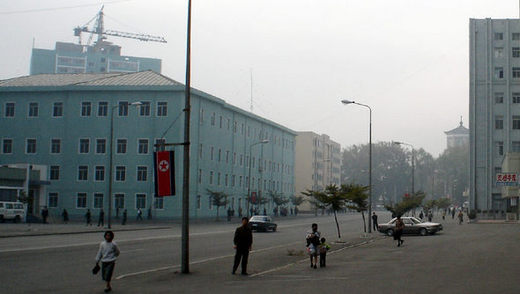 |
|
Downtown Pyongyang
|
Downtown Pyongyang looked full of life. Across from the Koryo Hotel, welders were busy making new stands where food would be sold. There seemed to be more vehicles on the streets than there were when I visited in the spring, and women were wearing more colorful clothing. Changgwang Street near Junggu Station, where restaurants are packed side-by-side, looked the same as in visits past. I was wrong to have expected things to have completely changed since the nuclear test. The center of Pyongyang was in a festive mood. Marking the 80th anniversary of the "Down With Imperialism Union" on this day, there were placards and signboards hanging everywhere. North Korean flags were affixed to streetlights and trees. North Koreans stressed the importance of the day by adding the placards to existing slogans, such as "Brightly inherit the Juche (self-reliance) revolution." According to North Korean historical accounts, their late leader Kim Il-sung founded the "Down With Imperialism Union" against the Japanese colonial power in 1926 at the age of 14. To celebrate the union’s anniversary, North Korea has designated October 17 as a national holiday. A North Korean official said that they decided to hold the event on a large scale, while reducing events marking the 61st anniversary of the foundation of the North’s ruling Workers’ Party. That night, there was a torchlight procession led by students from the Juche Tower Plaza to the monument of the Workers’ Party foundation. The Korean Central News Agency, the North’s state-run media, repeatedly broadcast footage from the torchlight procession through the next day. According to reports by the North’s official newspaper Rodong Sinmun on October 18, citizens’ celebratory spirit spread throughout the streets, culminating in a party where students danced to express their joy. Regarding the nuclear test, North Koreans showed great confidence, a mood which spilled into the festivities. Even though I was only able to talk to an extremely limited number of persons, whenever I asked about the nuclear test, residents responded, "Aren’t you proud?" When I conveyed concern that the North’s nuclear test would led to Japan’s nuclear armament and a subsequent arms race and uncertain security situation in Northeast Asia, they said, "It’s no problem." A North Korean official guiding South Korean visitors to the Isang Yun Peace Foundation also stressed the greatness of the Korean race, mentioning the South’s Minister Ban Ki-moon recently becoming U.N. Secretary-General, the North Korean women’s soccer team’s wins, and the success of North Korea at the Asia Marathon Championship. I felt that in his mind, he also had the nuclear test on this list of Korean accomplishments. Another official spoke more frankly: "Even if we don’t eat well and our clothes are shabby, we can be proud of the fact that we have independent national defense capability and our nation has become a nuclear power." Despite the history of the foundation of the "Down With Imperialism Union," one might feel that the target of the union is the United States. The North Korea-U.S. confrontation must strain this communist nation. But North Korean officials, of course, do not use words like, "a strained political situation;" privately, however, they showed expectations that such a situation would not last for long. North Koreans seemed to want to convey their thoughts about the uncertain political situation to the outside world. Reporters from U.S. TV station ABC visited Pyongyang at the invitation of the reclusive regime on October 17. North Korea apparently invited them because they think their voices aren’t conveyed properly due to what they called the one-sided voice of the U.S. and the international community. North Koreans seemed to want to know the reaction of South Koreans to the nuclear test. When I responded, "South Koreans have a sense of fear for nuclear weapons themselves," a high-ranking official of Pyongyang stressed, "It’s never because of the South." His face hardened when he said, "It’s because of Bush." North Korea’s complaints regarding the suspension of South-North civil exchanges are based on the logic that the nuclear test was not aimed at stirring up the South. Instead, North Koreans did not forget to express their gratitude to South Korean representatives of the Isang Yun Peace Foundation, who visited Pyongyang when North Korea was suffering from being isolated. North Koreans seemed to consider this as a sign of "trust." A high-ranking official of North Korea said, "After the nuclear test, nothing has changed in Pyongyang. It is as it was. The South may think as if something serious happened, but this isn’t so." Even though we cannot be sure his words are coming from the heart, it is clear that North and South Korea view the nuclear test in a very different light.






